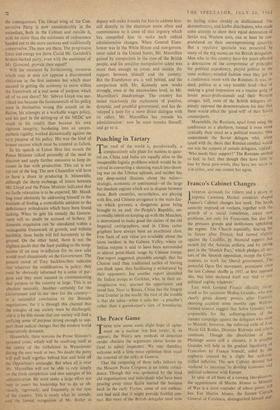The Peace Game
Pr HERE now scents sonic slight hope of agree- ' ment on a nuclear test ban treaty, if, as appears, the West's new methods of detection render obsolete the arguments about Soviet re- fusal to admit inspectors. We may therefore welcome with a little more optimism than usual the renewal of the talks at Geneva.
That the reopening of these talks follows on the Moscow Peace Congress is an ironic coinci- dence. Though this was sponsored by the tired old organisations and individuals who have been peacing away since Stalin started the business back in the early Forties, some of our enthusi- asts had said that it might provide fruitful con- tact. But most of the British delegates must now
be feeling either shoddy or disillusioned. The demonstrators, and leaflet distributors, who made some attempt to show their equal detestation of Soviet and Western tests, can at least be con- gratulated on their uncompromising sincerity. But a repulsive spectacle was presented by many of the big names on the British delegation. Men who in this country have for years affected a detestation of the compromise of principles for political expediency, played politics in the most ordinary-minded fashion once they-got in a conference room with the Russians. It was. in- deed, politics at a very humble level—that of making a good impression on a routine gang of Soviet peace-professionals and their Western stooges. Still, most of the British delegates ex- pressly opposed the demonstrations for fear that these-would affect the 'good will' of their Soviet counterparts.
Meanwhile, the Russians, apart from using the conference as a platform, treated it even more cynically than usual as a political exercise. One understands the Soviet delegate who, when taxed with the thesis that Russian conduct would not win the support of certain delegates, replied: 'Who needs their support?' The Russians seemed to feel, in fact; that though they have little to lose by these pow-wows, they have not much to win either, and one cannot but agree.


































 Previous page
Previous page